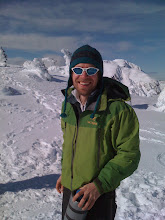The group set up last year by state lawmakers to tally the impacts of climate change in Alaska is holding its last public hearing today (Wednesday) in Anchorage.
The hearing is scheduled to last all day, with invited testimony running till 3:15 and public testimony coming after that. It's taking place at the legislative information office in Anchorage, but people elsewhere can listen in through their LIO or by calling (888) 295-4546.
Among those scheduled to speak is Fairbanks' own Luke Hopkins, who's on the Fairbanks borough Assembly and has been driving the push for a local response to climate change.
The full agenda is pasted below.
The Alaska Climate Impact Assessment Commission was supposed to do a final report with recommendations by January 10, but asked for and got an extension till February 29 -- making up for days lost last year to special sessions on oil and gas bills. Wednesday, October 10, 2007
Anchorage Legislative Information Office, Anchorage, Alaska
8:55am Dial teleconference bridge - (888) 295-4546
9:00am Chairman Samuels welcome / introductions / check teleconference
9:05am - 9:30am Dennis Nottingham, PND Engineers - Erosion Control in Alaska - Success and Failure
9:30am - 10:00am George Canelos, Federal Co-Chairman, Denali
Commission - Threatened Villages Relocation Issues
10:00am - 10:30am Lawson Brigham, Arctic Research Commission - Arctic
Marine Shipping Assessment for Alaska
(former 30-yr. Coast Guard officer, ice-breaker pilot)
10:30am - 11:15am A.O.G.A. presentation
11:15am - 11:45am Joseph David, Sr., Community Elder, Nunivak Island
11:45am - 1:00pm (lunch break)
1:00pm - 1:30pm Sue Mauger, Stream Ecologist, Cook Inletkeepers - Changes in Salmon Stream Habitat Due To Climate Warming
1:30pm - 2:30pm COL. Kevin Wilson, Commander, Alaska District, Army Corps. of Engineers;
Patricia Opheen, PE, Chief of Engineering Division, AK District, COE Jon Zufelt, Ph.D, PE, Army Cold Regions Research/Engineering Lab
2:30pm - 3:15pm Alaska Municipal League - Climate Warming Impacts on Alaskan Communities - Mayors Bruce Botelho, Juneau & Mark Begich, Anchorage, and Luke Hopkins, Presiding Officer, Fairbanks-North Star Borough Assembly Member
3:15pm - 3:30pm (afternoon break)
3:30pm - 5:00pm (open public testimony)
 I'll be celebrating today's holiday with a 'bou, specifically the one I shot a few weeks ago up on the North Slope. 'Bou stew for lunch, 'bou steaks in the freezer, 'bou burger waiting to get ground up . . .
I'll be celebrating today's holiday with a 'bou, specifically the one I shot a few weeks ago up on the North Slope. 'Bou stew for lunch, 'bou steaks in the freezer, 'bou burger waiting to get ground up . . .


